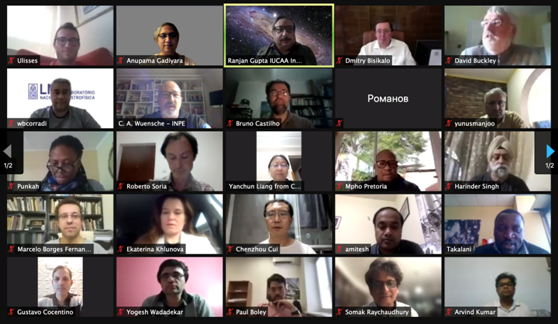DELHI MAY 21, 2021:
Delegates from BRICS nations highlighted the importance of enhancing collaboration among astronomers from the countries at the seventh meeting of the BRICS Astronomy Working Group Meeting.
Under the Science, Technology, and Innovation track of the BRICS 2021 calendar, India hosted the seventh meeting of BRICS Astronomy Working Group (BAWG) meeting of Brazil, Russia, India, China, and South Africa, as well as astronomers from these countries in online mode from 19 to 20th May 2021.
From the Indian side, the Inter-University Centre for Astronomy and Astrophysics (IUCAA), Pune, and Department of Science and Technology (DST), Government of India coordinated the meeting. It witnessed participation of all five BRICS countries with more than 50 participants, including researchers, academicians, and government officials.
The delegates deliberated on strategic and operational matters and recommended the networking of existing Telescopes in BRICS countries and create regional Data Network. They agreed to develop flagship project in this area. The members of the working group also indicated future directions of research in this area such as building network of intelligent telescope and data network, study of transient astronomical phenomena in universe, big data, artificial intelligence, machine learning application to process the voluminous data generated now a days due to enhance multi-wavelength telescope observatory.
The BAWG which provides a platform for BRICS member countries to collaborate in the field of astronomy recommended that the focal points in each country should present the scientific results of the work being carried out in each country. This will help seek funding support to realize the flagship project whenever funding opportunity announced by BRICS funding agencies. BAWG noted the importance of enhancing collaboration among astronomers from the BRICS countries.
Shri S. K. Varshney, Scientist G & Head international Cooperation presented India (DST) perspectives and lead scientific researchers from each BRICS country presented their country report highlighting research activities and research infrastructure they have created.
The key scientific institutions which participated from BRICS countries included Tata Institute of Fundamental Research Mumbai, Indian Institute of Astrophysics, Bangalore, National Center for Radio Astrophysics Pune, Delhi University from India; National Laboratory on Astrophysics; Brazilian Center for R

esearch in Physics, National Institute for Space Research from Brazil; the Institute of astronomy of the Russian Academy of Sciences, Russia; National Astronomical Observatories, Chinese Academy of Sciences, China; the African Astronomical Society, South Africa.
India has assumed the BRICS Presidency from January 2021, about 100 events, including Ministerial level meetings, Senior Official meetings, and sectorial meetings/conferences, will be organized as part of BRICS 2021 Calendar.

 हिंदी
हिंदी






